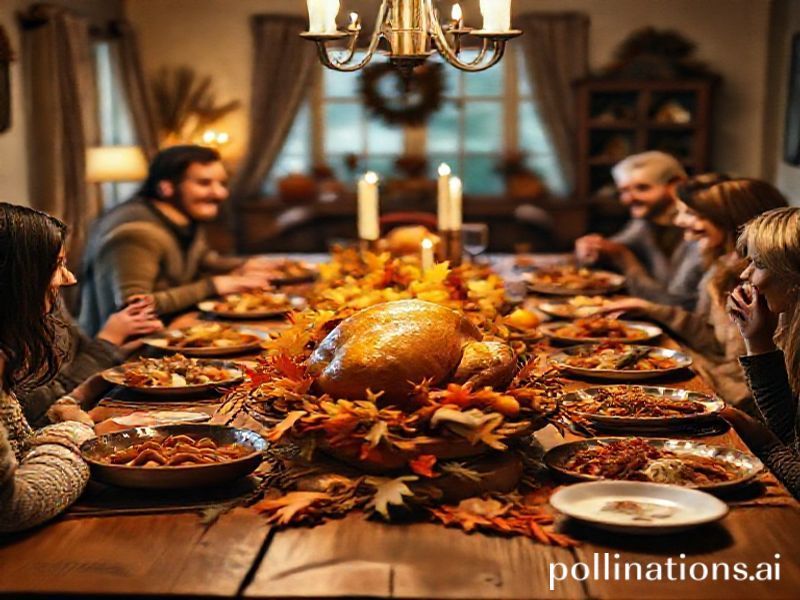Gobble Up the Trends: Why Thanksgiving is the New Global Meme-Fest
**Title: Gobble Up the Trends: Why Thanksgiving is the New Global Meme-Fest**
Alright, folks, gather ’round the digital table because we’re about to carve into the trend that’s got the world talking—Thanksgiving! That’s right, the annual feast of gratitude, family, and questionable political debates has transcended its U.S. origins and is now a global phenomenon. But why, you ask? Let’s dive in, shall we?
**A Global Feast of Gratitude**
Thanksgiving, traditionally celebrated on the fourth Thursday of November, is a time for Americans to express gratitude, share a meal, and watch football (or avoid family drama, but that’s a story for another day). But in the age of the internet, this holiday has become a cultural export, with people worldwide joining in on the fun.
From Canada (who, by the way, celebrate their Thanksgiving in October—sorry, not sorry, maple syrup lovers) to Japan, where “Thanksgiving Day Parades” are a thing, the world is embracing the spirit of gratitude. Even in countries where Thanksgiving isn’t a public holiday, the idea of a day dedicated to giving thanks is resonating. It’s like the internet’s favorite mantra: “Why not?”
**The Social Impact: Meme-Worthy Moments**
Thanksgiving’s global trendiness can be attributed to the internet’s love for all things relatable. The holiday is a goldmine for memes, from the infamous “Turkey Neck” to the “Family Feud” meme, which perfectly captures the essence of awkward family gatherings.
Social media platforms are flooded with Thanksgiving-themed content, from food pics (because who doesn’t love a good, golden-brown turkey?) to heartwarming posts about gratitude. Even celebrities and influencers are jumping on the bandwagon, sharing their own Thanksgiving traditions and encouraging their followers to do the same.
**The Dark Side of the Bird: Cultural Appropriation and Controversies**
But not everyone is on board with the global Thanksgiving train. Critics argue that the holiday’s commercialization and cultural appropriation overshadow its original meaning. The debate around Thanksgiving’s colonial roots and the treatment of Native Americans is a sensitive topic that’s gained traction online, sparking conversations about the holiday’s true significance.
Moreover, the pressure to have a “perfect” Thanksgiving can lead to stress and anxiety, with social media often exacerbating these feelings. It’s a reminder that while trends can bring people together, they can also highlight societal issues that need addressing.
**Why It’s Significant**
Thanksgiving’s global trend is significant because it reflects the internet’s power to spread ideas and traditions across borders. It’s a testament to our shared humanity and the universal desire to connect, give thanks, and share a meal (preferably one that doesn’t involve trying to carve a turkey like a pro).
But more than that, it’s a reminder that trends are more than just fleeting fads. They’re opportunities for dialogue, reflection, and cultural exchange. So, whether you’re team turkey or team tofurkey, let’s embrace the spirit of gratitude and use this trend as a catalyst for meaningful conversations.
**Conclusion: Pass the Gravy, Please**
In conclusion, Thanksgiving’s global trend is a delicious mix of cultural exchange, social impact, and internet culture. It’s a reminder that in a world that’s often divided, we can still find common ground over a shared meal and a heartfelt “thank you.”
So, as you gather ’round your own tables this Thanksgiving, remember to give thanks—not just for the food, but for the connections we make and the conversations we have. And if all else fails, just remember: there’s always next year’s trend to look forward to.
Now, if you’ll excuse me, I’ve got a date with a pumpkin pie.







